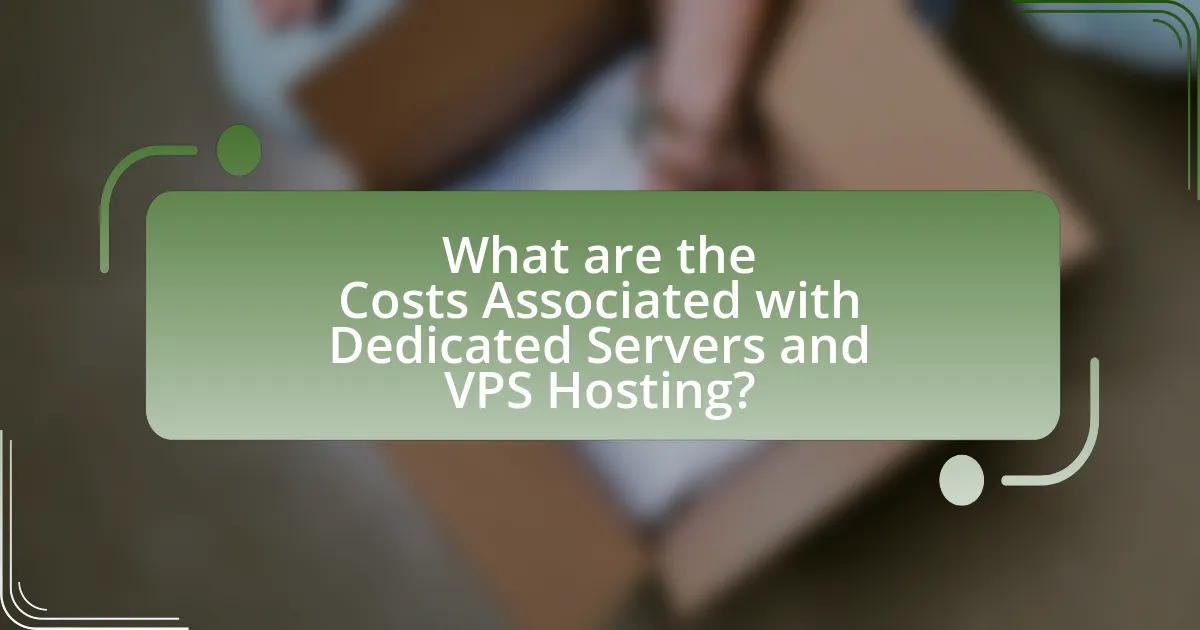Dedicated servers and VPS (Virtual Private Server) hosting are two distinct hosting solutions that cater to different business needs. Dedicated servers provide exclusive access to a physical server, offering complete control, enhanced performance, and security, making them ideal for high-traffic websites and resource-intensive applications. In contrast, VPS hosting utilizes virtualization to partition a single physical server into multiple virtual servers, allowing users to benefit from dedicated resources in a cost-effective manner. This article compares the features, advantages, and costs associated with both hosting options, helping businesses determine which solution best aligns with their performance, scalability, and budget requirements. Key considerations include the specific use cases for each type of hosting, the industries that typically benefit, and the long-term financial implications of choosing one over the other.

What are Dedicated Servers and VPS Hosting?
Dedicated servers are physical servers exclusively allocated to a single user or organization, providing complete control over the server’s resources, configuration, and security. This type of hosting is ideal for businesses with high traffic demands or specific compliance requirements, as it offers enhanced performance and reliability.
VPS (Virtual Private Server) hosting, on the other hand, involves a single physical server that is divided into multiple virtual servers, each operating independently. This allows users to have dedicated resources within a shared environment, making VPS hosting a cost-effective solution for businesses that need more control than shared hosting but do not require an entire dedicated server.
Both dedicated servers and VPS hosting provide distinct advantages depending on the user’s needs, such as performance, scalability, and budget considerations.
How do Dedicated Servers differ from VPS Hosting?
Dedicated servers provide an entire physical server dedicated to a single user, while VPS hosting utilizes virtualization technology to partition a single physical server into multiple virtual servers, each allocated to different users. This means that dedicated servers offer complete control over server resources, including CPU, RAM, and storage, without sharing with others, which is ideal for high-traffic websites or applications requiring significant resources. In contrast, VPS hosting shares the underlying physical server, leading to potential resource limitations and performance variability based on the activities of other users on the same server. The distinction is significant, as dedicated servers typically deliver superior performance, security, and customization options compared to VPS hosting, which is often more cost-effective but may not meet the demands of resource-intensive applications.
What are the key features of Dedicated Servers?
Dedicated servers offer several key features that distinguish them from other hosting options. Firstly, they provide exclusive access to all server resources, ensuring optimal performance and reliability for high-traffic websites or applications. Secondly, dedicated servers allow for complete customization, enabling users to configure hardware and software according to specific needs. Additionally, they offer enhanced security measures, as users have full control over security protocols and can implement tailored solutions to protect sensitive data. Furthermore, dedicated servers typically come with higher bandwidth and storage capacities, accommodating larger volumes of data and traffic. These features collectively make dedicated servers a preferred choice for businesses requiring robust performance and security.
What are the key features of VPS Hosting?
VPS hosting offers several key features, including dedicated resources, scalability, root access, and enhanced security. Dedicated resources ensure that users have a specific amount of CPU, RAM, and storage allocated to their virtual server, which improves performance and reliability. Scalability allows users to easily upgrade or downgrade their resources based on their needs, making it suitable for growing businesses. Root access provides full control over the server environment, enabling users to install custom software and configure settings as desired. Enhanced security features, such as isolated environments and customizable firewalls, protect against potential threats, making VPS hosting a secure option for hosting applications and websites.
Why choose Dedicated Servers over VPS Hosting?
Dedicated servers are often chosen over VPS hosting due to their superior performance, control, and security. Dedicated servers provide exclusive access to all resources, ensuring optimal performance for high-traffic websites or resource-intensive applications. In contrast, VPS hosting shares resources among multiple users, which can lead to performance bottlenecks. Additionally, dedicated servers allow for complete customization of hardware and software configurations, enabling businesses to tailor their environments to specific needs. Security is also enhanced with dedicated servers, as they are less vulnerable to attacks that can affect multiple users on a VPS. These factors make dedicated servers a preferred choice for organizations requiring high reliability and performance.
What are the performance advantages of Dedicated Servers?
Dedicated servers offer superior performance advantages due to their exclusive resources and high customization capabilities. Unlike shared hosting or VPS, dedicated servers provide full access to CPU, RAM, and storage, ensuring optimal speed and reliability for demanding applications. This exclusivity allows for consistent performance under heavy loads, making them ideal for high-traffic websites and resource-intensive tasks. Additionally, dedicated servers can be tailored to specific needs, enabling the installation of specialized software and configurations that enhance performance further.
In what scenarios are Dedicated Servers more beneficial?
Dedicated servers are more beneficial in scenarios requiring high performance, complete control, and enhanced security. For instance, businesses with resource-intensive applications, such as large databases or high-traffic websites, benefit from the dedicated resources and processing power that dedicated servers provide. Additionally, organizations that handle sensitive data, like financial institutions or healthcare providers, find dedicated servers advantageous due to their ability to offer superior security measures and compliance with regulations. Furthermore, dedicated servers are ideal for companies anticipating significant growth, as they can easily scale resources without the limitations often associated with shared or virtual environments.
What are the advantages of VPS Hosting compared to Dedicated Servers?
VPS Hosting offers several advantages over Dedicated Servers, primarily in cost-effectiveness, resource allocation, and scalability. VPS Hosting typically costs significantly less than Dedicated Servers, making it a more budget-friendly option for businesses that require dedicated resources without the high price tag. Additionally, VPS Hosting allows for better resource allocation, as multiple virtual servers can run on a single physical server, optimizing hardware usage and providing users with dedicated resources like CPU and RAM. Furthermore, VPS Hosting is highly scalable; users can easily upgrade their resources as their needs grow, whereas Dedicated Servers often require more complex and costly upgrades. These factors make VPS Hosting a flexible and economical choice for many users.
How does VPS Hosting provide cost-effectiveness?
VPS Hosting provides cost-effectiveness by allowing multiple users to share the same physical server while maintaining dedicated resources, which reduces overall expenses. This model enables businesses to access features similar to dedicated servers, such as increased performance and security, at a fraction of the cost. For instance, VPS plans typically start at a lower price point than dedicated servers, often ranging from $20 to $100 per month, compared to dedicated servers that can exceed $100 monthly. Additionally, VPS Hosting eliminates the need for businesses to invest in expensive hardware and maintenance, as the hosting provider manages the physical server infrastructure.
What flexibility does VPS Hosting offer to users?
VPS Hosting offers users significant flexibility in resource allocation, allowing them to customize their server environment according to specific needs. Users can choose the amount of CPU, RAM, and storage, enabling tailored performance for applications and websites. Additionally, VPS Hosting supports various operating systems and software configurations, granting users the ability to install and run applications that suit their business requirements. This level of customization is backed by the fact that VPS environments are isolated, meaning changes made by one user do not affect others on the same physical server, ensuring stability and control.

What are the Costs Associated with Dedicated Servers and VPS Hosting?
Dedicated servers typically cost between $100 to $500 per month, while VPS hosting ranges from $20 to $100 per month. The higher cost of dedicated servers is due to the exclusive use of hardware, which provides enhanced performance and security. In contrast, VPS hosting shares resources among multiple users, resulting in lower costs. According to a 2023 report by HostingAdvice, dedicated servers offer superior reliability and control, justifying their higher price point compared to VPS options.
How do the pricing models compare between Dedicated Servers and VPS Hosting?
Dedicated Servers typically have higher pricing models compared to VPS Hosting due to the exclusive resources and full control they offer. Dedicated Servers can range from $100 to over $500 per month, depending on specifications, while VPS Hosting generally costs between $20 to $100 per month, as it shares resources among multiple users. This price difference reflects the level of performance, security, and customization available with Dedicated Servers, which are suited for high-traffic websites and applications, whereas VPS Hosting is more cost-effective for smaller projects or businesses with moderate resource needs.
What factors influence the cost of Dedicated Servers?
The cost of dedicated servers is influenced by several key factors, including hardware specifications, bandwidth, data center location, and support services. Higher hardware specifications, such as more powerful CPUs, increased RAM, and larger storage capacities, directly increase the price. Bandwidth requirements also affect costs; higher data transfer limits or faster connections typically lead to higher fees. The geographical location of the data center can impact pricing due to regional operational costs and demand. Additionally, the level of technical support and management services offered can further influence the overall cost, as more comprehensive support packages generally come at a premium.
What factors influence the cost of VPS Hosting?
The cost of VPS hosting is influenced by several key factors, including resource allocation, server location, management level, and provider reputation. Resource allocation refers to the amount of CPU, RAM, and storage assigned to the VPS; higher allocations typically lead to increased costs. Server location affects pricing due to varying operational costs in different regions, with data centers in high-demand areas often charging more. The level of management, whether managed or unmanaged, also impacts cost, as managed services generally come with higher fees due to the additional support provided. Lastly, the reputation of the hosting provider can influence pricing, with well-established companies often charging a premium for reliability and customer service.
What are the long-term financial implications of choosing either option?
Choosing between dedicated servers and VPS hosting has significant long-term financial implications. Dedicated servers typically involve higher upfront costs and ongoing maintenance expenses, which can lead to a greater total cost of ownership over time. In contrast, VPS hosting generally offers lower initial costs and more predictable monthly expenses, making it a more budget-friendly option for businesses with fluctuating resource needs.
For instance, a dedicated server may cost between $100 to $500 per month, while VPS hosting can range from $20 to $100 per month, depending on the resources allocated. Over a three-year period, the cost difference can amount to thousands of dollars, favoring VPS hosting for businesses looking to minimize expenses while still achieving adequate performance. Additionally, the scalability of VPS hosting allows businesses to adjust resources as needed without incurring the high costs associated with upgrading dedicated servers.
How does scalability affect the overall cost of Dedicated Servers?
Scalability directly impacts the overall cost of dedicated servers by determining the pricing structure based on resource allocation and usage. When a business requires additional resources, such as CPU, RAM, or storage, the cost increases accordingly, as dedicated servers typically charge based on the specifications and capabilities needed to support growth. For instance, a dedicated server with higher specifications will incur a higher monthly fee compared to a lower-spec server. Additionally, the ability to scale resources up or down can lead to cost efficiency; businesses can avoid over-provisioning and only pay for what they actually use. This dynamic pricing model is essential for managing operational costs effectively, especially in environments with fluctuating demands.
How does scalability affect the overall cost of VPS Hosting?
Scalability directly influences the overall cost of VPS hosting by allowing users to adjust their resources based on demand, which can lead to cost savings or increased expenses. When a business experiences growth, it can easily upgrade its VPS resources, such as CPU, RAM, and storage, without the need for a complete server overhaul, thus avoiding the high costs associated with dedicated servers. Conversely, if demand decreases, users can scale down their resources, reducing their monthly expenses. This flexibility in resource management is supported by the fact that VPS hosting typically operates on a pay-as-you-go model, where users only pay for the resources they utilize, making it a cost-effective solution for varying workloads.

What are the Use Cases for Dedicated Servers and VPS Hosting?
Dedicated servers are ideal for high-traffic websites, large databases, and applications requiring significant resources, while VPS hosting is suitable for small to medium-sized businesses needing cost-effective solutions with scalable resources. Dedicated servers provide complete control and customization, making them perfect for enterprises with specific compliance and security requirements. In contrast, VPS hosting offers a balance of performance and affordability, allowing users to manage their environments with root access while sharing physical resources. According to a report by HostingAdvice, dedicated servers are preferred for mission-critical applications, while VPS is often chosen for web hosting and development environments due to its flexibility and lower cost.
What types of businesses benefit from Dedicated Servers?
Businesses that require high performance, security, and control benefit from dedicated servers. These include e-commerce platforms that handle large volumes of transactions, gaming companies that need low latency and high uptime, and enterprises managing sensitive data that require compliance with regulations. Additionally, businesses with high traffic websites or applications, such as media streaming services, also gain from dedicated servers due to their ability to provide dedicated resources and enhanced reliability.
Which industries typically require Dedicated Servers?
Industries that typically require dedicated servers include e-commerce, gaming, finance, healthcare, and media streaming. E-commerce businesses need dedicated servers for secure transactions and high traffic handling, while gaming companies require them for low latency and performance. The finance sector relies on dedicated servers for data security and compliance with regulations. Healthcare organizations use dedicated servers to protect sensitive patient information, and media streaming services depend on them for delivering high-quality content without interruptions. These industries benefit from the reliability, performance, and security that dedicated servers provide, making them essential for their operations.
What specific applications are best suited for Dedicated Servers?
Dedicated servers are best suited for applications that require high performance, security, and control. These applications include large-scale websites, online gaming servers, enterprise-level applications, and data-intensive tasks such as big data analytics and machine learning. For instance, large-scale websites like e-commerce platforms benefit from dedicated servers due to their ability to handle high traffic volumes and provide faster load times. Additionally, online gaming servers require dedicated resources to ensure low latency and a seamless user experience. Enterprise applications often demand robust security and compliance, which dedicated servers can provide through customizable configurations. Data-intensive tasks, such as big data analytics, also thrive on dedicated servers because they can leverage the full processing power and memory without sharing resources with other users.
What types of businesses benefit from VPS Hosting?
Businesses that benefit from VPS Hosting include e-commerce sites, web development agencies, and companies with high traffic websites. E-commerce sites require reliable uptime and scalability to handle fluctuating customer traffic, while web development agencies need a flexible environment for testing and deploying applications. Companies with high traffic websites benefit from the dedicated resources and enhanced performance that VPS Hosting provides, allowing them to manage increased user demands effectively. According to a study by HostingAdvice, 70% of businesses reported improved performance and reliability after switching to VPS Hosting, highlighting its advantages for various business types.
Which industries typically prefer VPS Hosting?
Industries that typically prefer VPS Hosting include e-commerce, web development, digital marketing, and gaming. These sectors benefit from VPS Hosting due to its balance of cost-effectiveness and performance, allowing for scalable resources and enhanced control over server environments. For instance, e-commerce businesses require reliable uptime and fast loading speeds to ensure customer satisfaction, while web developers often need customizable environments for testing and deploying applications. Digital marketing agencies utilize VPS for hosting multiple client websites efficiently, and gaming companies leverage VPS for hosting game servers that require low latency and high performance.
What specific applications are best suited for VPS Hosting?
VPS hosting is best suited for applications that require dedicated resources and enhanced performance without the cost of a dedicated server. Specific applications include web hosting for medium to large websites, application hosting for software development and testing environments, game servers for multiplayer online games, and virtual private networks (VPNs) for secure remote access. These applications benefit from the scalability, flexibility, and control that VPS hosting provides, allowing users to customize their server environment according to their specific needs.
What should you consider when choosing between Dedicated Servers and VPS Hosting?
When choosing between Dedicated Servers and VPS Hosting, consider the level of control and resources you require. Dedicated Servers provide complete control over the server environment and dedicated resources, making them ideal for high-traffic websites or applications that demand significant processing power. In contrast, VPS Hosting offers a virtualized environment with shared resources, which is suitable for smaller businesses or projects with moderate traffic. According to a study by HostingAdvice, 70% of businesses that require high performance and security prefer Dedicated Servers, while 60% of startups opt for VPS due to its cost-effectiveness and scalability.
How do your business needs influence your choice?
Business needs significantly influence the choice between dedicated servers and VPS hosting by determining the required resources, performance, and scalability. For instance, businesses with high traffic and resource-intensive applications typically opt for dedicated servers to ensure optimal performance and reliability, as dedicated servers provide exclusive access to all hardware resources. Conversely, businesses with moderate traffic and budget constraints may choose VPS hosting, which offers a balance of performance and cost-effectiveness by sharing resources among multiple users while still providing dedicated virtual resources. This decision-making process is supported by industry data indicating that 70% of businesses prioritize performance and reliability when selecting hosting solutions, highlighting the direct correlation between specific business needs and hosting choices.
What technical requirements should you evaluate?
When evaluating technical requirements for dedicated servers versus VPS hosting, consider factors such as CPU performance, RAM capacity, storage type and size, bandwidth allocation, and operating system compatibility. These elements directly impact the server’s ability to handle workloads efficiently. For instance, dedicated servers typically offer superior CPU performance and RAM capacity, making them suitable for resource-intensive applications, while VPS hosting provides a more cost-effective solution with adequate resources for moderate workloads. Additionally, storage options like SSDs in dedicated servers can enhance speed and reliability, while bandwidth allocation affects data transfer rates. Understanding these requirements ensures that the chosen hosting solution aligns with specific performance needs and operational goals.
What are the best practices for selecting the right hosting solution?
The best practices for selecting the right hosting solution include assessing your specific needs, evaluating performance requirements, and considering scalability options. First, identify the type of website or application you are hosting, as this will dictate the necessary resources. For instance, a high-traffic e-commerce site may require a dedicated server for optimal performance, while a small blog might function well on a VPS.
Next, analyze the performance metrics such as uptime guarantees and load speeds offered by potential hosting providers. According to a study by HostingFacts, 99.9% uptime is the industry standard, and anything below that can significantly impact user experience and SEO rankings.
Finally, consider the scalability of the hosting solution. As your website grows, your hosting needs may change; therefore, choose a provider that offers easy upgrades or additional resources. This flexibility is crucial for accommodating traffic spikes or expanding your online presence.




